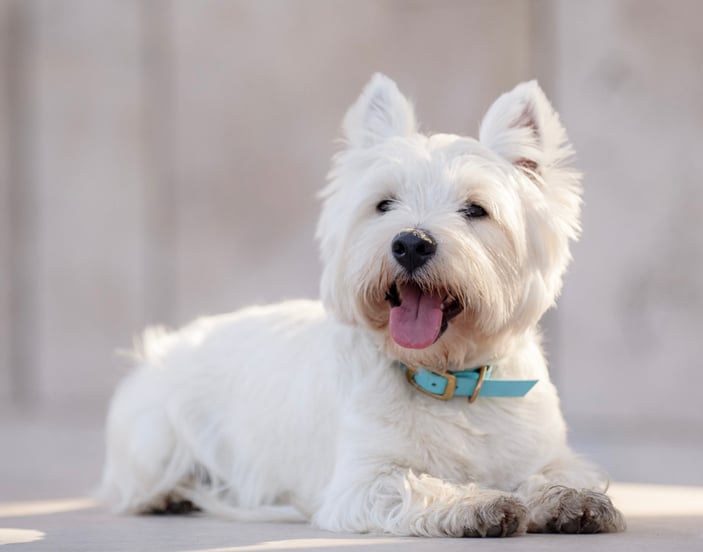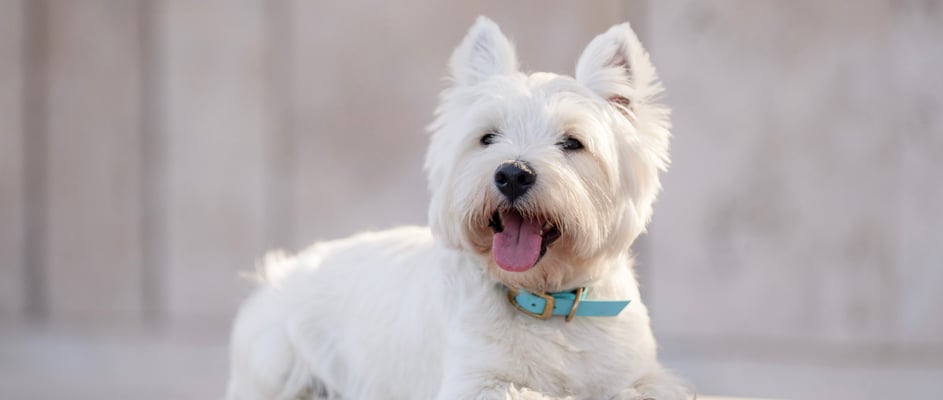The guide to owning a West Highland White Terrier.
Want to know everything there is to know about finding the right dog for you? Submit your email below, and we’ll send you a one-stop guide to help you on your pet-ownership journey.
Jump to:
Stats at a glance.
A history of West Highland Terriers.
Say hello to the West Highland Terrier, also known as the Westie. These cheerful little dogs hail from Scotland, and their story weaves through centuries of dedicated breeding.
Legends suggest they were originally bred by Colonel Edward Donald Malcolm of Poltalloch to specialise in hunting small rodent intruders.
In fact, people once referred to them as Poltalloch Terriers and Roseneath Terriers.
Their bright white coat of fur wasn’t chosen just for style. Because they were bred to hunt among rugged Scottish terrain, that distinctive white made them easy to see, helping to avoid confusion with darker prey.
Eventually, the Kennel Club recognised them as a white terrier breed. Over time, these clever pups became one of
Britain’s most popular breeds, making their way into homes as affectionate, fun-loving companions.
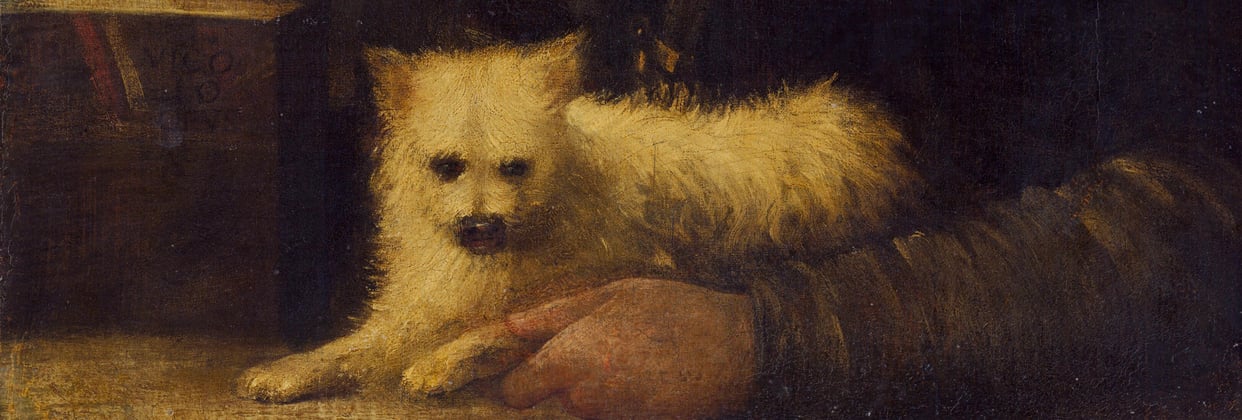

How much is a West Highland Terrier puppy (UK)?
If you’re thinking of adding a West Highland White Terrier to your family, it’s worth understanding the initial cost.
These adorable West Highland pups in the UK might range anywhere from £1,000 to £2,500, depending on factors like breeder reputation, pedigree dog lineage, and demand for Westie puppies.
If you're going the pedigree route, always look for a breed club-registered or Kennel Club-listed breeder who can show you health screening certificates.
If you’re new to dog ownership, we recommend meeting both puppy parents, confirming the health tests (so you’ll know about any potential health issues), and ensuring that the pups are well-socialised.
Colours and coat types.
Unlike other dog breeds with varied coats, the West Highland White Terrier breed draws its charm from its signature white double coat.
You may notice a coarse outer layer and a plush undercoat. This gives the dog that famously fluffy, white coat that stands out in a crowd.
Coat types
Technically, West Highland Terriers don’t offer a rainbow of coat colours; their one defining look is that cloud-like white.
But you’ll still want to know about the texture of this double coat. If you adopt a puppy, be prepared for occasional hand-stripping or clipping, especially if you plan to keep them looking like show dogs.
If you’d like more detailed advice on bathing, you can read our guide on how to bathe a dog. It covers gentle cleansing, which is especially important since Westies can be prone to skin sensitivities.
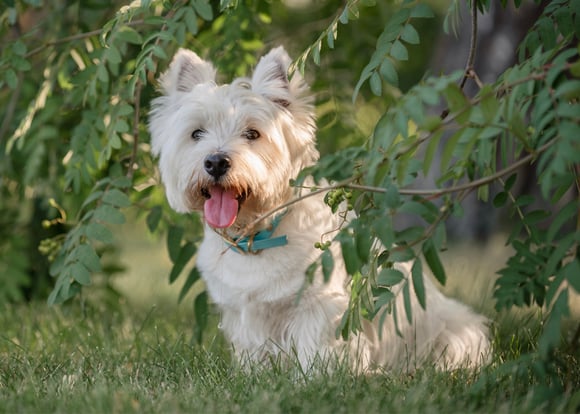
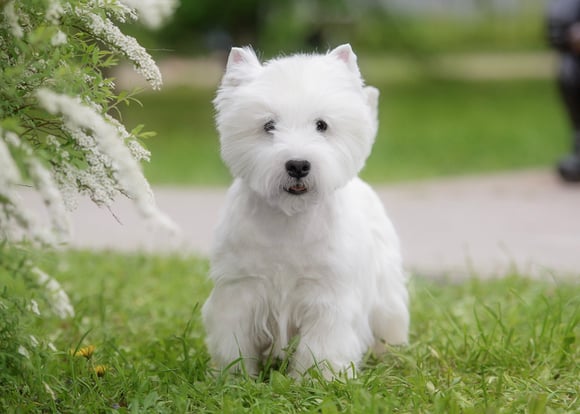
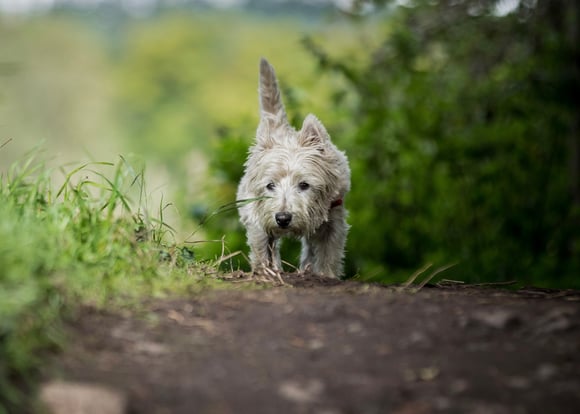
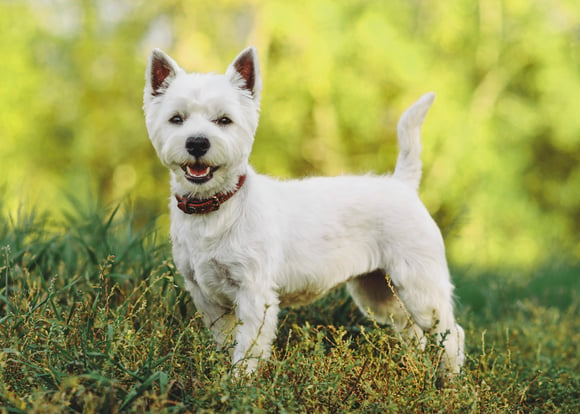
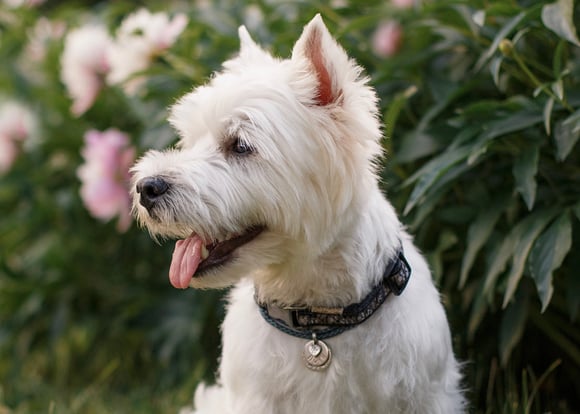
Size and weight.
Westies may be little dogs, but they’re sturdy for their height. Standing at roughly 25–28cm tall and weighing 6–10kg, they’re compact enough to adapt to smaller homes yet robust enough for the occasional countryside trek.
While they’re shorter than some terriers like the Cairn Terrier or Scottish Terriers, they still have the classic big-dog attitude in a petite frame.


Temperament and behaviour.
Temperament
Don’t let that adorable face fool you. West Highland Terriers have lively minds, strong self-confidence, and a dash of mischief. They love being part of a family and are surprisingly eager to please, especially when food rewards are involved.
Their high prey drive was shaped by their history as vermin hunters, so they can be quick on their paws when they sense small critters nearby.
Do West Highland Terriers make good pets?
Yes, they make wonderful companion dogs. They’re spirited, affectionate, and grow very attached to their families.
Just keep in mind that they’re a true terrier puppy at heart, so a bit of sass often comes with the package.
Are West Highland Terriers good with kids?
Their size and funny nature can make them good with children, provided everyone plays gently. Although they’re known to tolerate rough handling better than some breeds, no dog likes tail-pulling or ear-yanking, so show kids how to respectfully interact with your adorable West Highland Terrier.
Are West Highland Terriers good with cats?
With the correct introductions, many Westies learn to coexist with cats. Still, it’s wise to remember their prey drive.
Keep an eye on them, especially around smaller animals. Early socialisation goes a long way here.
Behaviour
Living with a West Highland White Terrier can be full of fun. But those bright eyes and perky ears come with a strong sense of curiosity. They may dig up your garden or chase after a stray hedgehog if you’re not careful. Terriers do love a good rummage for anything scurrying about underground.
Do West Highland Terriers suffer from separation anxiety and can they be left alone?
Some Westies do experience it because they form strong bonds with their owners and thrive on attention. If you’re worried they might stress out while you’re away, read about socialising your puppy for tips that can also help reduce anxiety.
Most West Highland Terriers don’t appreciate being left alone for too long, even though they’re confident. Leaving them for more than four to six hours can lead to boredom. If you work full-time, consider hiring a dog walker or asking a friend to pop in for playtime.
Can West Highland Terriers live in apartments?
Yes. With the right amount of regular exercise and mental enrichment, they adapt well to smaller living spaces. But watch out for their bark as we mention below, they can be protective and vocal if they sense strangers.
Do West Highland Terriers bark a lot?
Many do have a habit of alert barking. They’re quite watchful and may let you know if a leaf so much as moves outside. Consistent training or distraction (like treat puzzles) helps to manage that noisy streak.
Training a West Highland Terrier.
Westies respond best when learning feels like play. Think of each session as a mini adventure with you as their guide.
Whenever you nail a new command, whether it’s “sit,” “target,” or “leave it”, celebrate with high-value treats and enthusiastic praise to keep motivation sky-high.
Are West Highland Terriers smart?
They’re bright, though that keen mind can test your patience. They’re easy to train if you keep sessions fun and use rewards rather than force.
Positive reinforcement, short sessions, and a variety of tasks really work for these dogs.
To build on this, try introducing simple scent games. Hide a treat under cups and let your Westie track it down.
Crate practice can create a safe haven at home and help with calm, independent time.
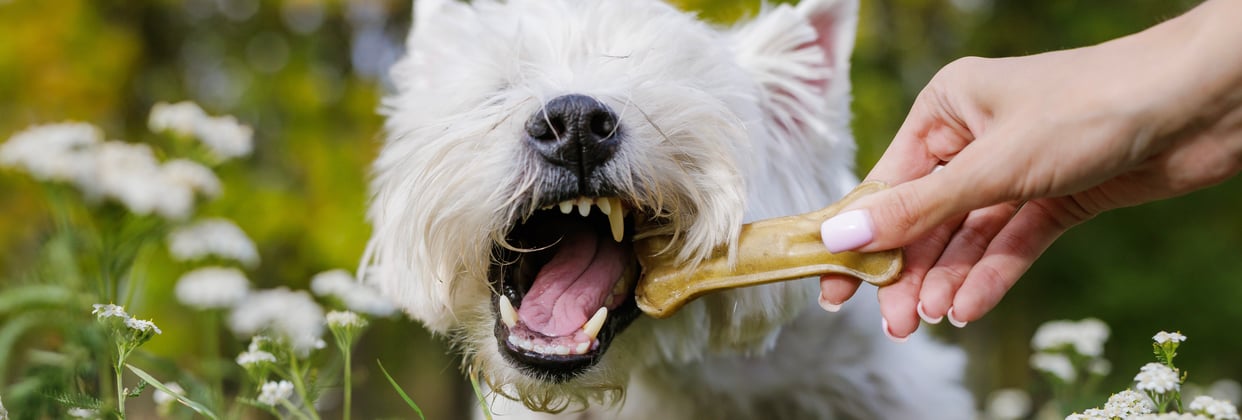

Shedding and grooming.
How often should I brush my West Highland Terrier?
Their white double coat benefits from brushing a couple of times a week. Some owners prefer hand-stripping (an expert can do this) to keep the coat’s texture in good shape and reduce matting.
Routine brushing helps remove dead hair, spread natural oils, and help remove any flea hitchhikers.


Exercise and mental stimulation.
Don’t underestimate their stamina. West Highland White Terriers enjoy daily walks (around 30–60 minutes total) and love a good chase-after-the-ball session.
They excel at puzzle toys and even Earthdog competitions, where they can safely channel that high prey drive.
Just like us, they need variety to keep their brains active. Try short training games, treasure hunts in the living room, or a romp outside, whatever suits them best.
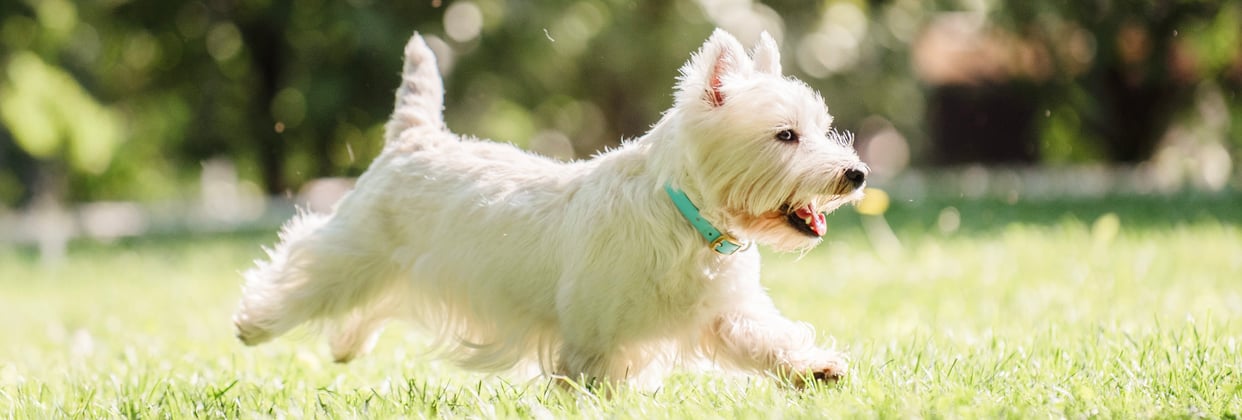

Feeding and nutrition.
Most Westies do best on high-quality dog food that’s appropriate for their age, weight, and activity level. Spread meals into two to three servings a day to help with digestion. Generally, this means 1/2 cup of kibble or other suitable food per meal twice a day. (for adults)
Because they’re prone to certain skin and dietary sensitivities, your vet or a qualified nutritionist can give advice on the right type for your pup.
As with any breed, watch out for overfeeding as obesity can burden their joints and lead to health difficulties.
Common health concerns.
Though typically quite robust, West Highland White Terrier puppies and adults can experience the following breed-specific conditions.
Here are a few potential health issues to keep in mind:
Note: Costs are approximate and can vary based on location and specific veterinary practices.
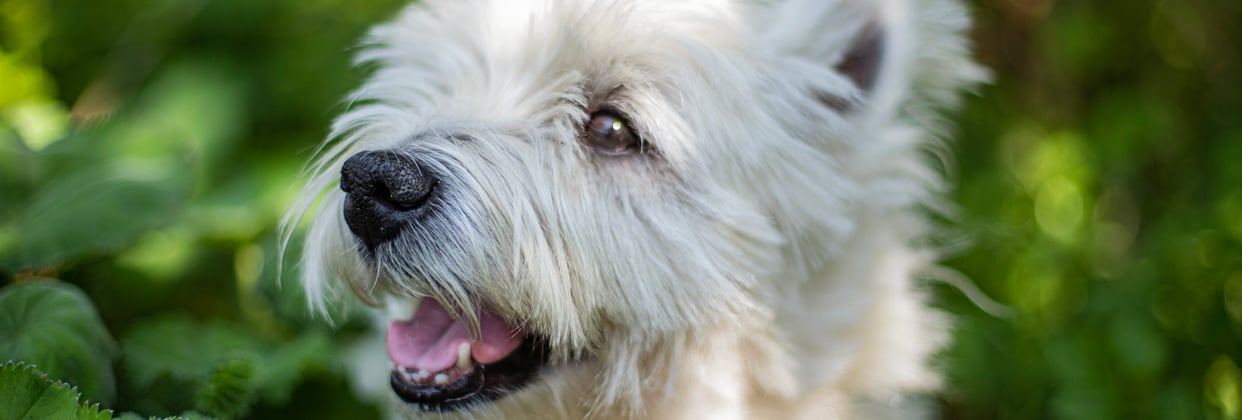

Pet insurance for West Highland Terriers.
Because West Highland Terriers can be prone to skin issues and other breed-linked concerns, having good pet insurance coverage is essential for peace of mind. We offer a policy designed with you and your pets needs in mind which you can see at our page here: West Highland Terrier Pet Insurance.
When you’re insured, you can feel confident about managing unexpected vet bills, getting access to nutrition help, and ensuring your forever home has a happier pup for years to come.
With proper check-ups, regular grooming, a dash of fun, and a plan for health coverage, your West Highland White Terrier can enjoy a long, delightfully zesty life by your side.
They may be small, but these adorable West Highland companions have hearts bigger than the Highlands they come from, and they’ll happily share that love with anyone who welcomes them into the family.
